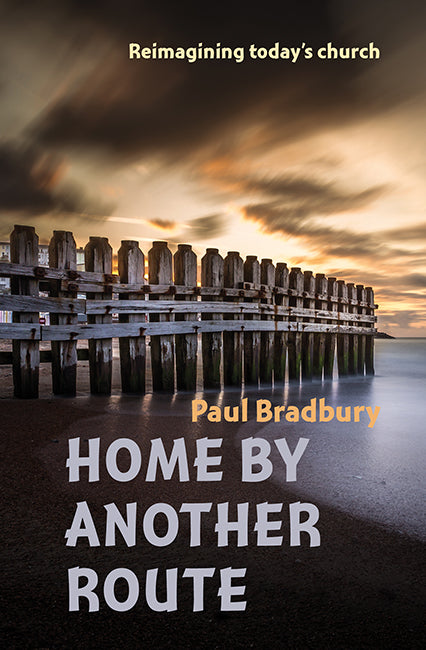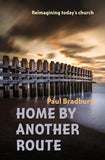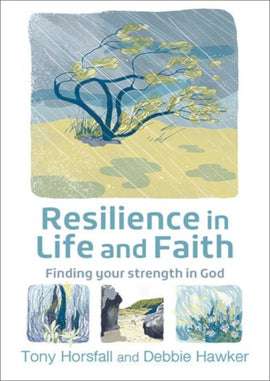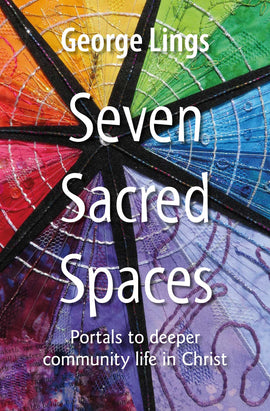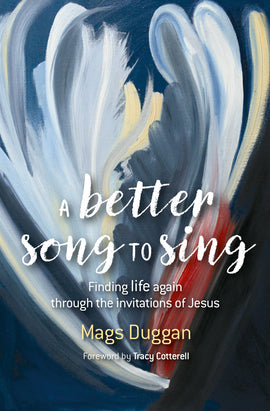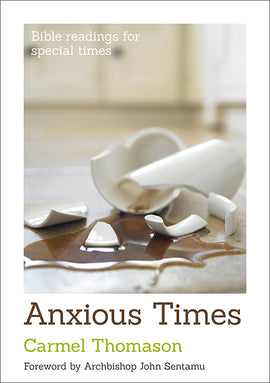Home by Another Route: Reimagining today's church
Renewal and reform for a church in exile
Paul Bradbury believes that a movement of the Holy Spirit is beginning to renew and reform today's church - a church marginalised and 'in exile'. Following on from Stepping into Grace, Bradbury takes the prophet's powerful image of dry skeletal human remains coming to life through the miraculous work of the Spirit of God to encourage and inspire the contemporary church to seek renewal through the Spirit. This is a compelling and prophetic book - a must-read for today's church.
Digital Product - This title is now out of print but is still available digitally. Please click the button below to buy on Kindle or click below to visit our eBooks collection to buy this product for your smartphone and/or tablet. - Go to eBooks
| Title | Home by Another Route: Reimagining today's church |
| Author | Paul Bradbury |
| ISBN | |
| Description | Paul Bradbury believes that a movement of the Holy Spirit is beginning to renew and reform today's church - a church marginalised and 'in exile'. Following on from Stepping into Grace, Bradbury takes the prophet's powerful image of dry skeletal human remains coming to life through the miraculous work of the Spirit of God to encourage and inspire the contemporary church to seek renewal through the Spirit. This is a compelling and prophetic book - a must-read for today's church. |
| Details |
|
Paul Bradbury believes that a movement of the Holy Spirit is beginning to renew and reform today's church - a church marginalised and 'in exile'. Following on from Stepping into Grace, Bradbury takes the prophet's powerful image of dry skeletal human remains coming to life through the miraculous work of the Spirit of God to encourage and inspire the contemporary church to seek renewal through the Spirit. This is a compelling and prophetic book - a must-read for today's church.
Paul Bradbury is a pioneer minister in the Church of England. He leads a missional community, based in Poole, with a vision to connect with unchurched people and support and train others involved in new forms of church.
To read Paul's lockdown blog click here.
This is powerful stuff from Paul Bradbury holding out Ezekiel as an example for leadership and pioneer ministry in our times. He draws wonderful insights from this old Bible prophet for a church that has essentially been exiled. His writing is really well crafted with lovely turns of phrase and it's a book that is both a fairly easy read but also runs deep. I found it inspiring and challenging in equal measure.
Jonny Baker, Director of Mission Education, CMS
Home by Another Route uses the metaphor of exile to describe the place of the 21st Century Church in a post Christendom world. It argues that a new ecclesial narrative can be found by understanding who we were, the acceptance of what we have lost and through this the discovery of who we might be. This book offers a valuable framework for those seeking to pioneer a future expression of church.
Revd Ed Olsworth-Peter, National Adviser for Pioneer Development
By creatively using metaphors of exile and home, along with insights from Ezekiel, Paul explores how exile can encourage our imaginations to rethink and retool what church might look like. I found this book to be challenging and hopeful for the place of the church in our world, encouraging a humble and decentered posture that might just make church more attractive to a generation that craves authenticity and integrity.
Cathy Ross, Lecturer in Contextual Theology, Ripon College, Cuddesdon, and MA Coordinator for Pioneer Leadership Training at CMS
Church Times, 13 March 2020. Review by the Rt Rev Paul Bayes, the Bishop of Liverpool
Paul Bradbury has a vision for the future of the Church. His account recognises and accepts the reality of the chaotic, fluid culture of the West. In such a context, he says, ‘Perhaps… the most fruitful way to explore our place as the Church in the maelstrom of the world is to play with story.’
The Bible is a good resource for playing with story – this complicated library of books which, certainly in the case of the Hebrew scriptures, has nothing direct to say about the preferred shape of the Christian Church. In its stories it is possible to find many echoes and pre-echoes of the way we might want to do things today.
For example, similar reflections have found their home in the Book of Nehemiah, which can be read as a series of helpful hints on building a Church as well as building a wall. Managerial and devotional lessons – vision, perseverance, prayer, teamwork – can be found in Nehemiah for the Churches and their leaders, if you can skate over some of the less politically correct stories in that interesting book.
Bradbury, on the other hand, draws on bleaker stories – in particular the image of the valley of dry bones in Ezekiel 37. He seeks to discern the Spirit moving among the bones today. As he does so, he shapes an attractive vision of the Church – a light, innovative, relational community, counter-cultural in its radical sharing, critical of consumerism and of an instrumental obsession with growth and prosperity. He finds in Ezekiel both the motivation for his own preferred way of being the Church, and the reassurance that God’s inspired word prefigures the choices that he and his community have made.
Bradbury’s approach rhymes interestingly with that of more conservative defenders of the inherited parish system, those who ask us simply to hold our nerve in hope, faithful to that which we have received, not changing a thing, waiting for the bones to reconnect. Like them, Bradbury is critical of an anxious Church that simply wants to find a winning formula and clone it. Unlike them, he sees the need to explore a radical ‘re-imagination’ of the ways things are, and could be, when Christians gather.
His book will therefore rattle many bones among those of us who explore and debate the renewing and reforming of the Church. For this reason, I recommend it gladly.
Reviewed by the Rt Rev Paul Bayes, the Bishop of Liverpool
The Reader, Autumn 2019. Review by Rosemary Medhurst
Does contemporary British Christianity, and the loss of influence of the church as an institution, have much in common with the experience of exile? This comparison focuses on Ezekiel, and particularly the vision of dry bones. ‘Can these bones live?’ is the question, and Ezekiel watches them restored. But God is doing a new thing, then beyond the structures of monarchy and temple, now beyond the structures of inherited church. Bradbury encourages us to venture out to participate in God’s initiatives – ‘missio dei’ – rather than continuing to try to pull people in. He warns provocatively against denial, even against overvaluing large busy churches, and promotes nurturing the various fresh expressions along the spectrum away from traditional church. This is a short book, but well supported by references, many from Brueggemann, including the health warning that ‘the usefulness of a metaphor for rereading our own context is that it is not claimed to be a one-to-one match’. Indeed, but an encouragement to share Ezekiel’s step into the unknown with the response: ‘Sovereign Lord, you alone know’.
Reviewed by Rosemary Medhurst
Reform, May 2019. Review by Ruth Maxey
Paul Bradbury is an Anglican pioneer minister who started a fascinating fresh expression in Poole – a missional community called ‘Reconnect’ that is living out a new way of being Church. He therefore brings a wealth of on-the-ground experience to the topic of ‘reimagining today’s Church’.
This is a misleadingly thin book, as the content is anything but thin! It’s heart is an in-depth analysis of the exilic period, with a particular focus on Ezekiel’s vision of the dry bones in Ezekiel 37. From this detailed biblical and historical analysis, Bradbury draws parallels with the context the Church finds itself in today. As Christian communities, we are also in exile, often looking back longingly and trying to recreate and maintain our old ways in a foreign land. We are often either in despair at the loss of the past, or looking to some kind of assimilation. Bradbury maintains that we need to see the creative opportunities that our present context offers us, as we allow the Spirit to work through us in new and exciting ways.
The phrase ‘home by another route’ comes from the story of the journey of the magi in Matthew’s Gospel. The magi do return home, but they are changed by their encounter and return by another route. The Church is also called to ‘return by another route’, we cannot simply try to do the old things better, we need to find another route. Bradbury rightly claims that ‘recreating Jerusalem in the landscape of Babylon is not an option’.
As someone who is part of a community that is seeking to reimagine the Church, I was very much drawn to the topic. But this is not a practical ‘how to’ book, it is one to take time with, to chew over, to re-read. It is not a book for someone looking for simple answers on how to reimagine the Church today. This is a book for those who are prepared to think deeply and theologically about the context in which we find ourselves, and to look to the wealth of biblical tradition for wisdom and inspiration.
Ruth Maxey is a pioneer minister at Church without Walls, Milton Keynes
Inspire, March 2019. Review by John Woods
This is a readable reflection on Ezekiel’s Dry Bones passage in Ezekiel Chapter 37. The author sees the prophet as a pioneer, who has a fresh God-given take on what can be done on the present and the future.
Paul Bradbury leads what he calls a missional community attached to the Church of England; he views the UK Church as a community in exile. By this the author means that the Church should operate within a society where Christianity does not provide the primary language or narrative for most people.
Bradbury finds a breath-taking hope of a homecoming in Ezekiel’s message to the exiles. Yet this homecoming, if it is to occur, might involve coming back by another route.
The author provides a useful spectrum for assessing the nature of church leadership: Church Replicators, who repeat that which has always been done; Pioneer Adaptors, who use things like Messy Church and Café Church to create fresh zones for people to explore Christianity, and Pioneer Innovators who use more explorative, low-key ways to get alongside those who are seeking to make sense of life, God and the universe.
I found this book to be a stimulating read but wondered if at times it fell between the stools of being an academic or a popular treatment. I think I would also have liked a little bit more meat on the bones concerning how Pioneer innovators “venture into the edges of postmodern culture”.
That said here is a timely invitation to reimagine the way we do church, that is open to the breath of the Spirit and seeks to be shaped to come alongside those beyond the “usual suspects”!
John Woods is pastor of Lancing Tabernacle in West Sussex
Irish Methodist Newsletter. Review by Stephen Skuce, District Superintendent, North Western District
The world has changed significantly over the past 50 years. The church has not necessarily changed as much. Consequently, the two are a bit more disconnected than they previously were. This isn’t a breaking news story but it’s how we understand and respond to this that is crucial. Paul Bradbury reflects on this with an understanding that the church today finds itself in exile, albeit that society has moved on and the church is somewhat marooned.
Ezekiel’s vision of the valley of dry bones is the thread that holds this book together. Each chapter takes a different aspect of the prophet’s vision, with the recurring questions as to whether the bones (or church) can live again. Based on his experience as a pioneer minister, Bradbury avoids platitudes or somewhat mechanical solutions. He views the problem as primarily a spiritual problem that needs a spiritual answer.
The book’s title recognises that the church is not able to return to what it was. The visit of the Wise Men to Jesus changed their lives and following God’s warning, they went home by a different route. Bradbury argues that church restoration and renewal of the past is no longer for today, and we as the church need to find another route to our home, or place of peace, safety and prosperity. ‘Recreating Jerusalem in the landscape of Babylon is not an option’ (p.85). Those in exile start to understand how God is with them, not in the ways of the past which are gone, but in the new strange world they find themselves a bit reluctantly in.
Today people are still interested in spirituality and understanding who God is. They no longer focus this search on the church but rather follow numerous alternative ways. Indeed, perhaps this is now the norm and the church is one of the alternatives. This is all part of the uncomfortable place that is exile. Bradbury reflects on his pioneer ministry with the Church of England in Poole in southern England. I don’t think this shows us a model as to how to respond. It does show us one response and challenges us to find our own ways to respond to living in exile.
Ultimately ‘all our efforts at refounding, renewal, reform will be nothing unless they are built on a renewal of our reliance on God’ (p105). That is both our challenge and direction
Review by Rev’d Dr Stephen Skuce, District Superintendent, North Western District

